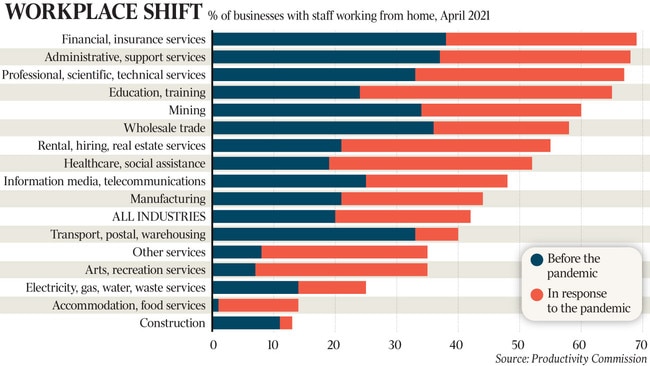Working from home revolution to promote wellbeing and boost nation’s productivity
A major study shows remote working is here to stay and workers and employers could soon share the spoils of the productivity boost.

The forced experiment of working from home during Covid-19 lockdowns has changed Australia forever, and broadly for the good, presaging a more flexible, dynamic and productive world of work.
A new report by the Productivity Commission has found this sudden and pervasive shock to the labour market will unlock “new-found value to be shared between workers and firms”.
“Governments should not fight it,” the report states, noting firms, cities and rules have the capacity to adapt to make the nation richer.
“As with past technologically enabled changes in work practices, the outcome of this evolution is likely to be positive overall”.
But the commission puts into perspective this enduring shift, after 40 per cent of workers were shunted home during lockdowns. Even if all workers who could work from home did so two days per week, only 13 per cent of all hours would be worked remotely.
As employers and employees fashion new hybrid models, the commission found the traditional workplace will remain the dominant mode, noting fears of the death of CBDs are exaggerated.
The commission observed a second wave of experimentation is at play, with some workers trading away pay and changing jobs to avoid long commutes and to meet family obligations. Businesses are learning what attracts desirable workers in this sorting process.
“Over time, the diffusion of successful innovations is likely to reduce the overall costs of working from home and limit any risk of lower productivity,” the report states, adding the wellbeing benefit of remote working provides a strong incentive to make it work.

Yet not everyone is a fan of the shift. “Working from home may increase co-ordination costs, reduce serendipitous interactions and knowledge-sharing, stymie creativity and decrease the effectiveness of collaborative processes,” the report states of employer views. “Separation from managers may also afford workers the opportunity to slack off”. The commission report notes employers and employees often express conflicting views in surveys.
“Over time, as firms and workers negotiate outcomes, learn and adapt, and become more effective at working from home, there are grounds for optimism at the economy-wide level,” the report states.
“In all likelihood, productivity will remain the same or improve under more widespread working from home.”
Commission chair Michael Brennan told The Australian he expected the proportion of hours worked from home to rise to between 7 to 13 per cent, from its pre-pandemic level of 2 to 5 per cent.
“It’s most likely the extra percentage points will be coming from those who can do it best,” Mr Brennan said of the highly paid, well-educated professionals at the frontier of remote working.
“People most likely to be working from home in the future are those where the employer is confident productivity won’t suffer. So, there’s no diminution and productivity could rise somewhat.”
The commission advises governments to smooth the way for remote work, unlocking opportunities for people with disabilities.
“But it is appropriate for governments to monitor labour market and regulatory settings to ensure they remain fit for purpose; that they are fair as well as flexible and efficient; and that they continue to promote the safety and protection of workers,” it states.
Mr Brennan added: “Risks can be managed but we should keep an eye on them and be ready to intervene if necessary.”
The commission states “speculation that working from home heralds the end of cities has little basis”. It considers a “tipping point” scenario that could lead to a downward spiral with the CBD being “hollowed out” of economic activity, with large falls in rents, and adverse effects on land values and government revenue.
“Countering any long-term pull away from cities are the enduring benefits that come from being located close to others. Agglomeration benefits – the economic benefits that are generated when many people and businesses cluster together – are likely to remain a strong incentive for businesses to locate in cities and for people to live close to city centres.”
While congestion imposes a substantial cost in large cities, remote workers make more frequent non-work trips in their cars.
“Unfortunately, increased working from home is unlikely to be the panacea to our congestion problems, at least in the short term,” the report concludes.




To join the conversation, please log in. Don't have an account? Register
Join the conversation, you are commenting as Logout